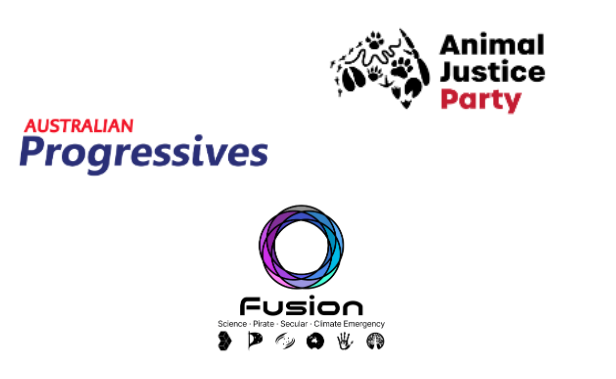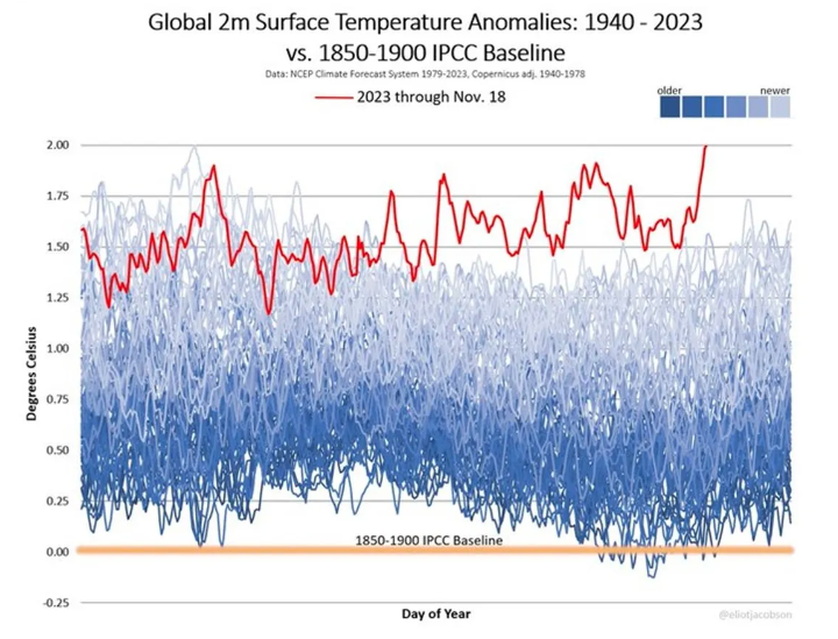|
Some excerpts from Climate Sentinel News by William Hall, author of Vote Climate 1’s monthly climate blog, “Earth’s climate system has shifted into a new kind of rapidly evolving climate regime that is not encompassed or anticipated by existing climate forecasting models (at least not before 2050…). Every month since September has set new, still more extreme records. ALL the global climate indicators are at or near all-time records so extreme that by September last year staid climate professionals have called the readings “gobsmackingly bananas.” — a phrase that is now in common usage in the climate science community.”
“...a common problem in climate science today [is that] most climatologists trained in maths or physics still fail to appreciate the importance of fundamental non-linearity and chaos of complex dynamical systems like climate. The existential emergency Sagan predicted for the latter half of the 21st Century has already started now.” “....many indicators are literally breaking records faster than I can write about them.” “The most important of these regularly breaking records is the daily average sea surface temperature (SST), which is the first place excess solar energy piles up in the climate system. On 9 May SST is still more than 0.1 °C above 2023’s 9 May record – the 423 day of continuous daily records.”
0 Comments
The Tasmanian election and the minority Liberal government it produced, gives us a lesson in how minority government can fail. It's a situation we must work towards avoiding Federally. Three red light candidates from Jacqui Lambie's party joined the Liberals to create a non-progressive state administration.
Unfortunately none of the seven out-standing green light independent candidates that signed up for the Climate Rescue Accord were elected. The only progressive independent to be elected was Craig Garland who we ranked with an orange light. More details on the Tasmanian election here. A successful outcome at a Federal level hinges on not just the erosion of Labor's majority. The Federal results must create a situation where the red light candidates in the lower house are not numerous enough for either major party to form government with them. The use of traffic light voting guides by swinging voters, especially in marginal seats, will help create a Federal minority government compelled to act decisively on climate. Many of us have been concerned about human induced global heating since the late 1980's or even earlier. As individuals we have worked to lead by example or, in the case of Extinction Rebellion, by disruptive protest. Emissions have continued to rise and heating of the oceans is rising exponentially. Vote Climate One maintains that we have generally failed here in Australia because none of our strategies have created the political will needed at a national level.
We are convinced that this political will could emerge from the creation of minority government. With global temperatures already at 1.5C above the pre industrial average, the next Federal election seems like our last chance to turn the ship around. Labor needs to be pulled back to say seventy seats to create a situation where they are compelled to negotiate the support of a progressive cross bench to form government. Climate Emergency Australia with Maribyrnong Council (Vic) ran the Climate Emergency Australia Conference 2024 for councillors and council staff on 19 March.
Bryony Edwards from the Climate Rescue Accord working group and Council and Community Action in the Climate Emergency (CACE) presented on appropriate council targets across the 3Rs: Reduce, Remove, Reflect: REDUCE: Real zero by 2030 REMOVE: Create biochar from all organic waste by 2030 Maximise soil carbon storage REFLECT: Maximise reflection across roads and roofs by 2030 Advocate for urgent R&D into safe methods for increasing Earth’s albedo. The Climate Rescue Accord has added an Adopters and Supporters page to the Climate Rescue Accord website. The page shows state or federally registered parties that have adopted or are adopting the 3Rs as well as organisational supporters of the 3Rs. Please get in touch If your party or organisation wants to get on board.
(Noting that this article was first published at ClimateSafety.info on 11 March 2024 and is used here with the author's permission.)
The Tasmanian state election, scheduled for 23 March 2024, has become a focal point for climate action with the introduction of the Climate Rescue Accord. This initiative, endorsed so far by 12 candidates – seven community independent candidates along with five candidates from the Animal Justice Party, seven women and five men – aims to significantly shift the state’s approach towards a safe climate. The Climate Rescue Accord focuses on the so-called “3Rs” – Reduce, Remove and Reflect – and it proposes comprehensive strategies to mitigate climate change impacts. Its adoption by candidates indicates a growing prioritisation of climate issues in Tasmania’s political discourse. Impact on voter sentiment According to polls, support for independent candidates and minor parties has increased, reflecting a potential shift in voter sentiment. The increase in support for independents and minor parties suggests a desire for broader representation and possibly a shift away from traditional two-party politics. There is the real potential for some of these candidates to hold the balance of power in the next Tasmanian parliament. This movement could lead to transformative policies that align with global climate goals, marking a critical step for Tasmania in addressing environmental challenges. This election cycle has seen a focus on issues such as healthcare, the cost of living, and environmental concerns, reflecting the priorities of Tasmanian voters. Political landscape changes The election will be the first to be held with the House of Assembly restored to 35 seats, a significant change from the previous number of 25 seats. This change aims to provide broader representation. With the election set to increase the number of seats in the House of Assembly, the outcome could significantly alter the political landscape in Tasmania, potentially leading to more coalition governance and a greater influence of minor parties and independents in the legislative process. The Liberal party has been in a minority government situation in Tasmania since May 2023. The Accord’s goals and strategies The Climate Rescue Accord aims to initiate action to halt global warming, ensure survival, reduce suffering, and restore a safe climate for all living beings. Its objectives include holding global temperature rise to the minimum possible, ensuring temperatures do not exceed 2°C and ideally returning below 0.5°C. The Accord represents a big picture vision and strategy for survival and a safe climate, reaching out to the cross bench and minor political parties to support this vision. The Accord emphasises reducing greenhouse gas concentrations to pre-industrial levels, supported by credible scientific evidence. The Climate Rescue Accord also highlights the importance of policy development, encouraging individuals and political parties to get involved in policy working groups, share information about the Accord, and sign up for their newsletter to stay updated. In the context of the Tasmanian election, the signing of the Climate Rescue Accord by candidates indicates a growing influence of climate-focused politics in Australia, especially among independents and minor parties. This movement reflects a broader trend toward addressing climate change with comprehensive, science-based approaches and leveraging political support for significant environmental action. Tasmanian candidates in support of the Climate Rescue Accord Bass Tim Walker (Independent) “I enjoyed reading about the Climate Rescue Accord on the website. I fully support the 3Rs and the Accord, and if I am successful in becoming a Tasmanian State parliamentarian, will look forward to advancing and supporting the actions outlined through the decisions I make.” Jack Davenport (Independent) “I support the use of the 3Rs and the Climate Rescue Accord to help inform decisions, supported by the best available evidence, I will potentially make in the Tasmanian parliament in relation to action on the climate emergency.” George Razay (Independent) George has endorsed the 3Rs and the Climate Rescue Accord. At a local level he is particularly concerned about the effect of pollution on public health. Ivan Davies (Animal Justice Party) The Animal Justice Party has fully endorsed the 3Rs and the Climate Rescue Accord. Lyons Angela Offord (Independent) “I support the use of the 3Rs and the Climate Rescue Accord to underpin decisions I will potentially make in the Tasmanian parliament in relation to action on the climate emergency.” Anna Megan Gralton (Animal Justice Party) The Animal Justice Party has fully endorsed the 3Rs and the Climate Rescue Accord. Clark Sue Hickey (Independent) “I support the use of the 3Rs and the Climate Rescue Accord to underpin decisions I will potentially make in the Tasmanian parliament in relation to action on the climate emergency.” Casey Davies (Animal Justice Party) The Animal Justice Party has fully endorsed the 3Rs and the Climate Rescue Accord. Franklin Martine Delany (Independent) “In brief, I’m entirely comfortable with offering my support for the 3Rs and the Climate Rescue Accord. They’re very nicely aligned with my thoughts on, and hopes for, future climate action. I seriously believe the world has no need of humans. If we’re unable, or unprepared, to work out how to live an existence more in balance with the rest of the global ecosystem, then people will disappear. And, in truth, the rest of the planet would undoubtedly find life much easier without us! Neither the world, nor the Universe, has any real need for us. The choice is ours.” Clare Glade-Wright (Independent) “I generally support the underpinnings of the 3Rs. Every decision that comes to parliament I would assess on each of their merits.” Jehni Thomas-Wurth (Animal Justice Party) The Animal Justice Party has fully endorsed the 3Rs and the Climate Rescue Accord. Notes: The Animal Justice Party candidates have not endorsed the 3Rs as individual candidates. Their commitment is through their party policy, unlike independents whose endorsement is personal. The Animal Justice Party have made their position clear via party policy. The research and information about the candidates was conducted and compiled by Vote Climate One. Vote Climate One will soon start working on preliminary Traffic Light Voting assessment of the Federal independents for the next Federal election. Animal Justice Party, The Australian Progressives and Fusion Party have acknowledged and committed to radical action required to avoid runaway global heating and further devastation. The required action includes zero emission across all sectors, sequestering excess carbon dioxide, plus immediate research and development into reflecting sunlight to actively cool the planet. The history of climate action in Australia is marked by weak targets and accounting tricks and ongoing approval of new fossil fuel projects. The major parties’ positions on climate change will lead to an unlivable earth. We hear endless talk of climate action and mitigation but within Australia, no MP or environmental-NGO advocates for a global vision and commensurate strategy to stop let alone reverse global heating. The Climate Rescue Accord has stepped into this leadership void. The Accord aims to bring other minor parties and independents on board, with several new parties set to sign on. The Accord is also reaching out to international stakeholders hoping to start a worldwide movement. While the Accord’s vision is to stop and reverse warming globally, the commensurate strategy is the 3Rs: Reduce (emissions to zero at emergency speed), Remove excess greenhouse gases, and Reflect sunlight to actively cool the planet until Reduce and Remove can achieve a safe climate on their own. To the 3rd R, Reflect, the Accord calls for urgent research and development to determine safe methods for making the earth more reflective. “The world has left it too long for net zero targets alone to avert the threat of runaway warming.” Explained Dr Adam Cardilini from the Accord’s Working Group. “At around 1.5C of warming we enter a world where runaway climate change becomes more and more likely. This would create a world that is unlivable for most people, animals, and ecosystems.” The idea of active cooling by reflecting sunlight is not new. There are calls for moratoriums of real world research into methods, such as use of aerosols, to increase Earth’s reflectivity. “There are many ways we can create an active cooling that don’t include the classic geoengineering options, such as use of aerosols in the stratosphere. Other options could include lightning roofs and roads or mirrors on the earth’s surface.” said Dr Cardalini. “However we don’t really know because the required research isn’t happening.” “We need to understand that we are already geoengineering between a half and one and a half degrees of cooling from aerosols created by burning fossil fuel. As we go to zero emissions, we need to offset this loss of cooling,” explained Bryony Edwards from the Working Group. The participating parties of the Accord have and are adopting policy that comprehensively reflects all 3Rs, including near-zero targets across all sectors, using the work of many groups that have been developing such plans, including Australia’s Beyond Zero Emissions. Mik Aidt, from the Accord Working Group, emphasised that active cooling by reflecting sunlight cannot happen without the other two Rs: Reduce and Remove. “The 3Rs are a complete package but active cooling alone is just a temporary bandaid. Ocean acidification, pollution, and greenhouse gas imbalances still need to be addressed via Reduce and Remove.” The Climate Rescue Accord began as climate policy conversation between executives and members from federally registered political parties. The Accord working group committed to the vision of stopping and reversing warming, bringing others on board including international stakeholders. Vote Climate One, a Climate Rescue Accord partner, has endorsed the 3Rs and will assess any candidates with regard to their embrace of the 3Rs through its traffic light voting guide. Rob Bakes from Vote Climate One said that, “The major parties have proven to be worse than useless on climate action. Minority government is the only way Australia can reorient itself to a future where we might just have a chance at survival.” “Unless there are parties that are willing to work together, as with the Climate Rescue Accord, we won’t get the change we need,” said Antoinette Pitt, representing the Australian Progressives. “On top of that we need the public to understand how preferential voting works - how to use their preferences.” Contact the Climate Rescue Accord working group: [email protected] The Climate Rescue Accord Working Group is one of three groups presenting at the Climate Cooling Mini Summit, a free online event hosted by the Sustainable Living Festival:
Saturday 24 February 1pm-4pm Book here to receive the link. The Climate Rescue Accord is now endorsed by the Animal Justice Party, Fusion Party, and the Australian Progressives Party. The Accord working group will present briefly on the Accord goals and workplan for 2024, including the political strategy. A panel discussion with the Accord working group will follow, facilitated by Mik Aidt. The Accord section of the Mini Summit is scheduled to start at 2:15pm. The two other groups presenting at the Climate Cooling Mini Summit are:
Read up on the full program and book here. It’s difficult to distill the records that are falling annually, monthly, and daily in 2023, and impossible to comprehend the horror behind the numbers. Average global warming for 2023 has been announced as 1.4°C, up from 1.2°C in 2022. We are witnessing accelerated warming on the cusp of a Southern El Nino Summer. Measures
Impacts
Just some of the impacts include:
The Climate Rescue Accord’s scope of work includes the development of a comprehensive suite of policy options to underpin each of the 3Rs, reduce, remove and repair.
While some high-level policies are non-negotiable (such as develop urgent roadmaps to near zero for all sectors) details will vary. Some parties might focus on renewable energy plus storage and others nuclear; high tech forms of agriculture versus regenerative agriculture options; different government levers or economic models. We aim to capture all in the Accord’s policy options, with pros, cons, tensions and unknowns highlighted. To build the policy suite, the Accord working group will be surveying experts and distilling relevant information. This work is huge and will continue through 2024. |
Archives
June 2024
Categories |





 RSS Feed
RSS Feed
